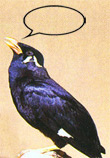| ||||||||
|
|
Why
Not(e)? PAGE
TWO: The aneurysm affected the Broca's area, a language center of the brain, so it drastically altered my abilities to speak, read, and write. Returning to an old Spanish textbook, I was recently reminded that there are two different Spanish words for an "earthquake." One is a temblor, the everyday kind that can be acknowledged before returning to one's café con leche, and the other is a terremoto, the kind of rumble that lifts tectonic plates like dinner settings, rearranging mountains and countries. The aneurysm was a terromoto, impossible to ignore, maybe a 7.6 on my imagined Richter Scale. It was a big one, but not The Big One, the quake occasionally joked about by Californians, usually in hushed, uneasy tones. That is not to say that I expect Bigger One will come for me (once in a lifetime is enough, thank you), but I can't think of the aneurysm in that impossibly large way, especially now, while it is finally becoming manageable. It was my neurologist who first advised me to sing along with the radio, her prescription for a neuroplastic routine. It was good enough advice and somewhat appropriate, because thirteen months ago, I was a performer, a writer, and a PhD student in Theatre Studies. It was also thirteen months ago when I became brain patient with a vocabulary of about 30 workable words. I soak up the music of language, anything I could borrow from. I mimic the song I hear and mimic you singing that song. Why not? If I once had a small way with words, words are now having their large way with me. And in spite of that, I see that my English is getting better, better than good. These days, I experience only rare outbursts of lack, which would be more unnerving if they weren't so miraculously insignificant. I can't order a dish in Spanish at my favorite Mexican restaurant, El Super Burrito. I can't keep the words of "The Pledge of Allegiance" straight, though I recited it every school-day from ages 6 to 13. Even the missteps are sometimes enjoyable, because it's only been a year, and I can read again. I can speak, if I occasionally stutter. I can write, even if I write about how incredibly difficult it is to write. I read every word I write down, say it aloud in cadence and time, listening to hear if the song works or not. I do
wonder though about this process -- this repeating, this recording,
this recovery --adding a world of words to my so recently barren
store. There is a picture that disturbs me: a reoccurring image
I have of a mynah bird, fixed on a perch, singing its bittersweet
tune. I've been told that the more perfect the bird's training,
the more perfectly she will be able to sound like the people around
her. But if the bird will sound more and more like you, then she
will also sound less and less like herself.
|










 When
I awoke 30-odd hours later, the doctors explained that a previously
undetected aneurysm had ruptured in my brain. That rupture had caused
the collapse that took me from the stage to the bar floor, a break
of blood that preceded to drown me inside of my skull, and had warranted
emergency brain surgery. I do find it a little unseemly or a little
uncanny, or both, to have had the most critical event of my life
arrive while I was singing a ridiculous power ballad, in a song
whose title itself sounds like a rallying cry for a body's catastrophe.
But regardless of oddity of the situation, the result of the rupture
was this: I largely lost English. It was my first language, the
language of my parents and my friends. A born Los Angeleno, my conversant
Spanish went missing, my German became nicht gut, and my already
bad French was entirely washed away.
When
I awoke 30-odd hours later, the doctors explained that a previously
undetected aneurysm had ruptured in my brain. That rupture had caused
the collapse that took me from the stage to the bar floor, a break
of blood that preceded to drown me inside of my skull, and had warranted
emergency brain surgery. I do find it a little unseemly or a little
uncanny, or both, to have had the most critical event of my life
arrive while I was singing a ridiculous power ballad, in a song
whose title itself sounds like a rallying cry for a body's catastrophe.
But regardless of oddity of the situation, the result of the rupture
was this: I largely lost English. It was my first language, the
language of my parents and my friends. A born Los Angeleno, my conversant
Spanish went missing, my German became nicht gut, and my already
bad French was entirely washed away.